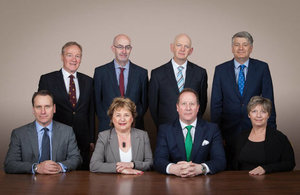Prime Minister rallies employers to help get 500,000 into work
- New figures show 347,000 people have moved into work since January – thanks to a Government-backed drive to fill vacancies
- With one month to go until the campaign ends, the Government is calling on UK employers to join forces with Jobcentres to help more people find work
- Alongside vital job support to lift incomes, the new £15 billion package to help with the cost of living will help millions of households
Today the Prime Minister and Work and Pensions Secretary urged employers of all sizes to use the free recruitment support from their local Jobcentre to help fill the record number of vacancies in the jobs market and support the continued economic recovery by getting people into work.
Since January, DWP Jobcentres across the UK have been ramping up operations with weekly jobs fairs – bringing employers in for face-to-face appointments and offering jobs on the spot to thousands of people.
Jobseekers walking away with roles have also secured an income, with those getting full time work set to be thousands of pounds better off than if they were on benefits. Helping households improve their finances and manage current cost of living pressures is a key priority for the government, with a £15 billion package announced yesterday to support almost all of the eight million most vulnerable households across the UK.
Today in the North East of England, the Prime Minister and Work and Pensions Secretary visited CityFibre, a new employer to the Way to Work campaign who have already benefitted from 200 new recruits from around the UK, hired through their local Jobcentres. During the visit, they also met local employees who have secured skilled jobs as a result of the campaign and the support of their local Jobcentre.
Prime Minister Boris Johnson said:
“I was only ten years old when unemployment was last this low.
“But with a vast number of vacancies in the jobs market, it is more critical than ever to access the huge pool of untapped talent in towns and cities right across the country, which is why I am thrilled with the progress we have made with the Way to Work scheme.”
Secretary of State for Work and Pensions Thérèse Coffey said:
Unemployment is at its lowest since the 1970s with full time workers across the UK £6000 better off than if they were on benefits.
And there are still vacancies to fill. That’s why our jobcentres are helping employers short circuit the recruitment process so they can get talent in fast.
So, if you’re hiring, make the most of the help on offer from us.
Greg Mesch, Chief Executive at CityFibre said:
CityFibre is rolling out the UK’s finest digital infrastructure to millions of homes and businesses nationwide. To build these new Full Fibre networks, we’re creating thousands of new network construction jobs and providing industry training to those that need it.
We and our construction partners are working closely with DWP nationally, and local Jobcentres, by engaging with schemes like Way to Work. We look forward to increasing our involvement in the future.
Alongside vital job support to help jobseekers secure an income, the new £15 billion cost of living support package will help almost all of the eight million most vulnerable households across the UK as they are set to receive help of at least £1,200 this year, including a new one-off £650 cost of living payment.
The government has also announced a £500 million increase for the Household Support Fund, delivered by local authorities, extending it to March 2023. This brings the total Household Support Fund to £1.5 billion.
To find out more about how DWP can help fill vacancies with quality candidates, please visit the Way to Work page on GOV.UK
Media enquiries for this press release
Follow DWP on:

